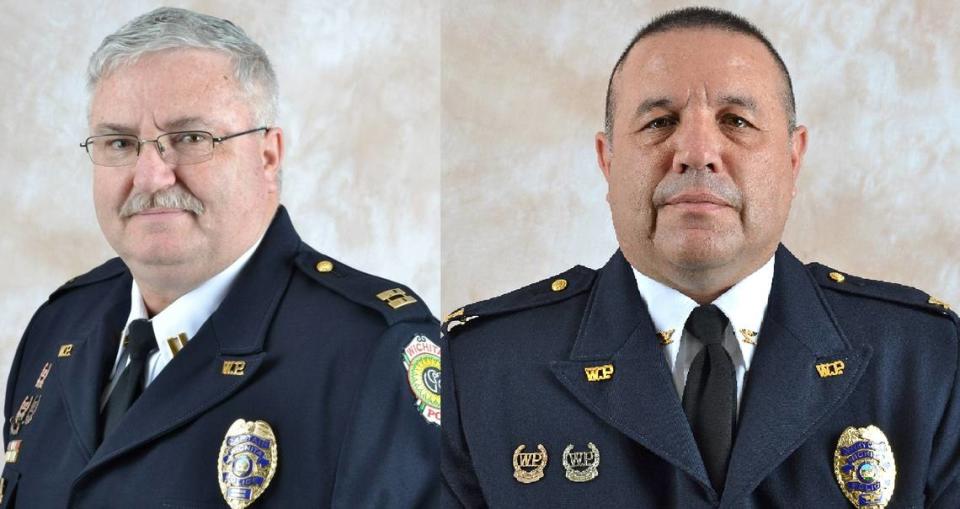Wichita ethics panel clears council member who accused police leaders of extortion
Wichita’s ethics board ruled Wednesday that City Council member and mayoral candidate Bryan Frye did not commit ethics violations when he accused two Wichita police leaders of extortion and called on them to resign in September.
Deputy Chief Jose Salcido and former Deputy Chief Chet Pinkston, who left the Wichita Police Department earlier this year for the top job in the Liberal Police Department, filed ethics complaints against Frye accusing him of attempting “to denigrate, extort, slander and retaliate” against them for threatening to sue the city.
They claimed Frye violated the city’s rules on whistleblower protections. They also alleged he violated a city ethics policy that prohibits council members from interfering in the hiring process and of failing to conduct himself “so as to maintain public confidence in the performance of [his] job duties.”
The Wichita Ethics Advisory Board struck down the allegations in two separate 5-0 votes on Wednesday night, noting that Frye’s statement did not amount to “intimidation, coercion, harassment, or retaliation.”
“It is noteworthy that Council Member Frye’s statement was not accompanied with any threats or force,” the EAB’s report says. “He simply stated that Deputy Chiefs Salcido and Pinkston should resign, without any statement regarding what actions he would take if they did not resign. The statement also was not made in a forceful or threatening manner.”
The board said Frye did not direct any city representatives to fire or take other action against the deputy chiefs.
“Absent such a directive, it is hard to imagine how Mr. Frye’s statement could be deemed retaliatory,” the findings say.
The ethics panel also noted that Frye was exercising his First Amendment right by expressing his opinion.
“It is difficult to understand how Council Member Frye’s comments on a matter of public concern would violate his duty to maintain public confidence in the performance of his duty,” the findings adopted by the board say. “Council Member Frye as an elected public official possesses a First Amendment right to express his opinion on such matters which is no less robust and no less strenuously protected than that afforded to the speech of citizens in general.”
Frye, in a brief speech from the City Council bench on Sept. 20, accused the two Wichita Police Department leaders of extortion and requested they step down.
“The definition of extortion: the practice of obtaining something, especially money, through force or threats,” Frye said. “It’s mindblowing that two current deputy chiefs of the Wichita Police Department have resorted to this tactic. Deputy chiefs Salcido and Pinkston should resign immediately.”
Salcido and Pinkston had sent the city a notice that they planned to sue the city of Wichita and several officials. They accused the city manager, human resources director and interim police chief of colluding with the Fraternal Order of Police to shield officers from discipline.

The letter, sent by civil rights lawyer and former Democratic congressional candidate James Thompson, notified the city that Salcido, Pinkston and former Deputy Chief Wanda Givens planned to sue unless the city met a list of demands. They asked for a payout of more than $2.1 million, resignations by City Manager Robert Layton and Human Resources Director Chris Bezruki and a public apology from the city.
The city declined, and the deputy chiefs filed a federal lawsuit against the city earlier this year. They’re also suing Frye for his comments, claiming they were part of “a concerted effort to remove” Salcido and Pinkston from their leadership roles in the police department.
Salcido and Pinkston, along with Givens and former Chief Gordon Ramsay, were criticized in a city report for failing to discipline SWAT team officers who sent racist, sexist, homophobic text messages that included jokes about shooting and beating civilians.
In their lawsuit, Pinkston, Salcido and Givens said the city thwarted their efforts to impose discipline on multiple occasions.
The ethics board’s report says Pinkston and Salcido declined to participate in the board’s investigation after filing their complaints. The ethics board’s investigator sent them a list of ten questions on March 3. Instead of answering questions, Thompson, their lawyer in the federal lawsuit, called the investigator on March 6.
“Mr. Thompson’s first question to the investigator was what is the investigator’s relationship to Det. Justin Rapp,” the report says.
Rapp, the son of prominent Wichita lawyer Larry Rapp, is the Wichita officer who shot and killed Andrew Finch in 2017. The city recently promoted Rapp to detective and paid out a $5 million settlement in a federal lawsuit filed against him by Finch’s family.
“The investigator explained that there is no known blood relationship,” the report says. “The investigator is acquainted with and friends with the Detective’s father, a now retired lawyer who practiced with the Foulston Siefkin Law Firm.”
Thompson clarified Wednesday night that the investigator was Wichita lawyer Dave Rapp, of Hinkle Law, a law firm hired by the city to investigate the ethics complaint by Salcido and Pinkston. Thompson said he asked the question because of the shared last name.
Jon Newman, the lawyer who advises EAB, works for Hite, Fanning and Honeyman. He was not involved in the investigation due to a conflict.
Thompson did not immediately comment on the EAB ruling Wednesday night.
Thompson also expressed concerns about answering the ethics advisory board’s questions in light of the pending federal lawsuit, the EAB report said. He told the investigator he would talk to his clients. No responses were ever sent to the EAB.
“The lack of response to the investigator’s questions does not impose a barrier to completing the investigation inasmuch as the complaint is focused on comments made by Council Member Frye which were captured on video and are also reflected in the City Council meeting minutes,” the report says.

